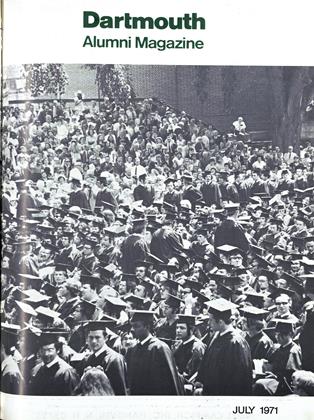A clue to the speed with which the computer is becoming an intellectual resource tool of the future was the response to the second annual Conference on Computers in Undergraduate Curricula which Dartmouth College hosted June 23-25.
More than 1,000 college and university professors from all parts of the country gathered in Hanover to examine the latest applications of highspeed computing power in a wide range of subjects embracing all the traditional academic disciplines: the humanities, the social sciences, and the sciences. Significantly, the participants were not computer scientists but were authorities in other fields who are finding how useful and exciting computing can be as a resource tool in teaching and learning.
The conference, supported through a grant from the National Science Foundation, was designed to provide a national forum for the presentation, discussion, and distribution of ideas, programs, and other curricular matters dealing with the use of the computer to enrich the instructional process at the undergraduate level.
Through a series of 20 panels, more than 75 leading practitioners of computer power presented papers and explored new and novel ways to use machines in the teaching of mathematics, physics and engineering, chemistry and biology, psychology and sociology, economics and business, and the humanities.
Prof. Thomas E. Kurtz, director of Dartmouth's Kiewit Computation Center, was a member of the conference steering committee and was in charge of local arrangements. President Kemeny gave the principal address, entitled "The Use, Non-Use, and Mis-Use of Computers by Colleges."
 View Full Issue
View Full Issue
More From This Issue
-
 Feature
FeatureThe Commencement Address
July 1971 By GUNNAR MYRDAL, Sc.D. '71 -
 Feature
FeatureAlumni Council Honors Seven
July 1971 -
 Feature
FeatureThe Fifty-Year Address
July 1971 By JOHN L. SULLIVAN '21 -
 Feature
FeatureHONORARY DEGREE CITATIONS
July 1971 By honoris causa. -
 Feature
FeatureCOMMENCEMENT 1971
July 1971 By CHARLES J. KERSHNER -
 Feature
FeatureMcCulloch Heads Council
July 1971







